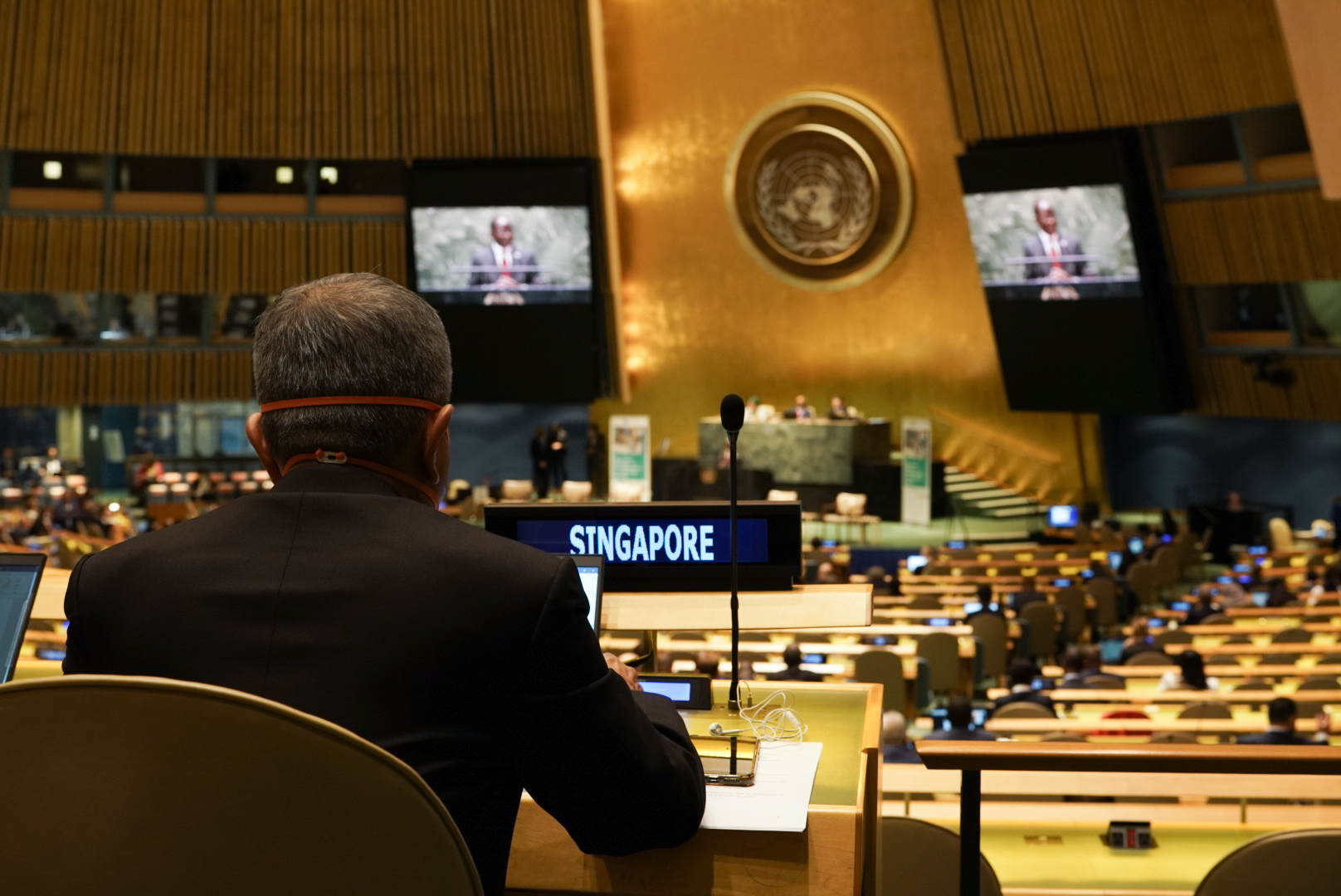At UN, Vivian urges small states to stand up for multilateralism, international law
Sign up now: Get ST's newsletters delivered to your inbox

Dr Balakrishnan (above) is in New York until Friday for a series of UN-related meetings.
PHOTO: TWITTER/VIVIAN BALAKRISHNAN
WASHINGTON - The war in Ukraine is a defining moment for small states, who cannot and should not remain passive, Foreign Minister Vivian Balakrishnan said at the United Nations in New York on Thursday (April 28).
He called on small states to stand up for the multilateral system and international law, arguing that its tenets as spelled out in the UN Charter - that all states big or small, have sovereign equality under international law - are critical for their survival.
“It requires a clear and principled position,” said Dr Balakrishnan of the Russian invasion of Ukraine, now into its third month.
“The violation of the sovereignty and territorial integrity of one country by another country is simply not acceptable in this day and age. For small states, it is important for us to take a principled position and speak out against violations of international law whenever and wherever they occur,” said Dr Balakrishnan, who is in New York until Friday for a series of UN-related meetings.
He was speaking at an informal high-level roundtable session of the Forum of Small States, an informal grouping started by Singapore in 1992 for small states to work together and amplify their concerns.
Thursday’s session, convened by Singapore as the grouping marks its 30th anniversary, centred around the theme of small states, multilateralism, and international law. It was moderated by Singapore’s permanent representative to the UN Burhan Gafoor.
Dr Balakrishnan also made the point that any effective multilateral system depends on all states big and small, respecting the UN Charter and international law.
“The international legal framework is not perfect, we all know that. However, compliance with the Charter and international law is critical for peace, security, the protection of human rights and the economic development, which all our citizens demand,” he said.
He added that strengthening the UN and the multilateral system was also important to address the many global challenges countries are facing today.
Representatives of several countries - both large and small - spoke at the session, with some like Jamaica’s Foreign Affairs Minister Kamina Johnson-Smith echoing Singapore’s sentiment.
“The rules-based international system is our safeguard and international law stands as our first line of defence against global challenges,” she said.
China, too, defended multilateralism and said it believed in the equality of all countries regardless of size and population.
But Mr Zhang Jun, China's permanent representative to the UN, said that “true multilateralism” also means mutual respect of countries.
“Countries should really accommodate security concerns through dialogues, through addressing difficulties through peaceful means,” he said. “True multilateralism has nothing to do with bloc politics, with group confrontation, with Cold War tactics.”
China has not condemned Russia’s invasion of Ukraine, and repeats Moscow’s position that it was driven by legitimate security concerns. It has also criticised the US-led drive to internationally isolate and financially punish Russia for its actions.
Closing the session, Dr Balakrishnan said: "Small states don't have a choice...other than to support multilateralism, comply with international law, to insist to the maximum extent on sovereign equality.”
Calling multilateralism and international law a “recipe for peace”, Dr Balakrishnan said: “We actually have no choice. Big states have a choice. Big states have the strategic option of not complying and not constraining themselves to these principles. But it is our plea and our argument that actually these principles make sense for big states."
Earlier on Thursday, Dr Balakrishnan also spoke on behalf of Asean at a high-level meeting on the UN’s New Urban Agenda, which focuses on well-planned and well-managed sustainable urbanisation.
He said sustainable urbanisation is a key priority for Asean, with half of the Asean population living in urban areas and another 70 million people expected to live in cities by 2025.
To harness the benefits of urbanisation while addressing its risks and challenges, Asean cities will need to improve digital connectivity, tackle the expanding resource footprint of cities, and strengthen resilience against disasters and the potential impact of climate change, he added.
Singapore on its part has launched the Singapore Green Plan 2030, under which there are ambitious, concrete targets to add another 200ha of nature parks, 200ha of skyrise greenery and 300km of nature ways on the island by 2030, he said.
Efforts are also underway to transition the majority of buildings in Singapore to green buildings, which are more energy efficient, and to enhance the accessibility of all public spaces.
Dr Balakrishnan said Singapore remains committed to enhancing cooperation with the UN and the UN-Habitat, a programme for sustainable urban development. The Republic will continue to share its urban practices and offer capacity building support to other countries, including through the Singapore-UN Habitat International Leaders in Urban Governance Programme as well as the World Cities Summit, he added.
On Friday, he will speak at a high-level commemorative plenary meeting of the UN General Assembly, to mark the 40th anniversary of the adoption of the UN Convention on the Law of the Sea.


